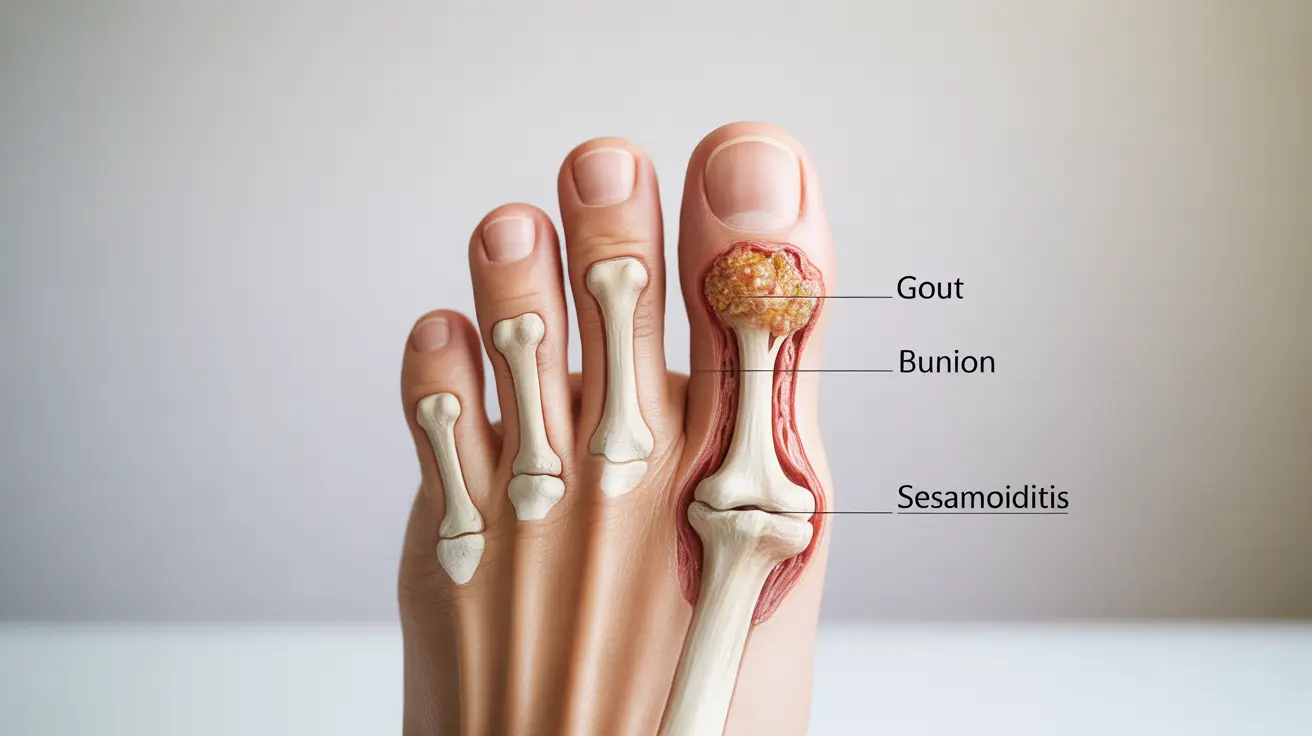Experiencing sudden sharp stinging pain in your big toe can be both alarming and debilitating. This type of pain can significantly impact your daily activities and may signal various underlying conditions that require attention. Understanding the causes, symptoms, and treatment options is crucial for managing this uncomfortable condition effectively.
In this comprehensive guide, we'll explore the most common reasons for sharp big toe pain, how to identify different conditions, and when you should seek medical attention.
Common Causes of Sharp Big Toe Pain
Several conditions can trigger sudden sharp pain in the big toe, each with distinct characteristics and treatment requirements:
Gout
Gout is a form of inflammatory arthritis characterized by sudden, intense pain often starting in the big toe. It occurs when uric acid crystals accumulate in the joint, causing severe pain, redness, and swelling. The pain typically starts at night and can be so intense that even the weight of a bedsheet feels unbearable.
Bunions
A bunion forms when the big toe joint becomes misaligned, creating a painful bump at the base of the toe. This condition can cause sharp pain, especially when wearing shoes or during physical activity. The pain may become more intense as the condition progresses.
Sesamoiditis
This condition involves inflammation of the small bones under the big toe joint. Athletes and dancers frequently experience this type of pain, particularly during activities that put pressure on the ball of the foot.
Identifying the Source of Your Toe Pain
Different conditions causing toe pain often present unique symptoms that can help identify the underlying cause:
- Gout pain typically comes on suddenly and is most severe within 12-24 hours
- Bunion pain usually develops gradually and worsens with tight shoes
- Injury-related pain occurs immediately after trauma and may be accompanied by bruising
- Arthritis pain tends to be chronic and may worsen with weather changes
Treatment Options and Relief Measures
The appropriate treatment depends on the underlying cause of your toe pain. Here are some common approaches:
Conservative Treatments
Many cases of toe pain can be managed with conservative methods:
- Rest and elevation of the affected foot
- Ice therapy for acute pain and inflammation
- Over-the-counter pain medications
- Proper footwear with adequate toe space
- Toe spacers or orthotics when appropriate
Medical Interventions
More severe cases may require professional medical treatment:
- Prescription medications for gout or arthritis
- Physical therapy exercises
- Custom orthotics
- In some cases, surgical intervention
Prevention Strategies
Taking preventive measures can help reduce the risk of developing sharp toe pain:
- Wear properly fitting shoes with adequate toe room
- Maintain a healthy weight to reduce pressure on toe joints
- Practice good foot hygiene
- Address any foot abnormalities early
- Choose appropriate footwear for specific activities
Frequently Asked Questions
What are the common causes of sudden sharp stinging pain in the big toe?
The most common causes include gout, bunions, sesamoiditis, arthritis, and acute injuries. Each condition has specific characteristics and may require different treatment approaches.
How can I tell if my sharp toe pain is due to gout or an injury?
Gout typically causes sudden, intense pain that often starts at night, accompanied by redness and swelling. Injury-related pain usually occurs immediately after trauma and may show visible bruising or swelling. Gout pain is often described as more severe and may feel "hot."
What treatments are effective for relieving sharp pain in the big toe caused by arthritis or bunions?
Effective treatments include anti-inflammatory medications, proper footwear, orthotics, ice therapy, and in some cases, physical therapy. Severe cases might require surgical intervention, particularly for bunions that don't respond to conservative treatment.
When should I see a doctor for sudden, severe pain in my big toe?
Seek medical attention if you experience severe pain that limits your ability to walk, signs of infection (redness, warmth, fever), pain lasting more than a few days, or if you have underlying conditions like diabetes that affect foot health.
How can wearing the wrong shoes contribute to sharp big toe pain and how can I prevent it?
Tight or ill-fitting shoes can compress the toes, leading to bunions, corns, and aggravation of existing conditions. Prevention includes wearing shoes with adequate toe box space, proper arch support, and avoiding high heels for extended periods.




